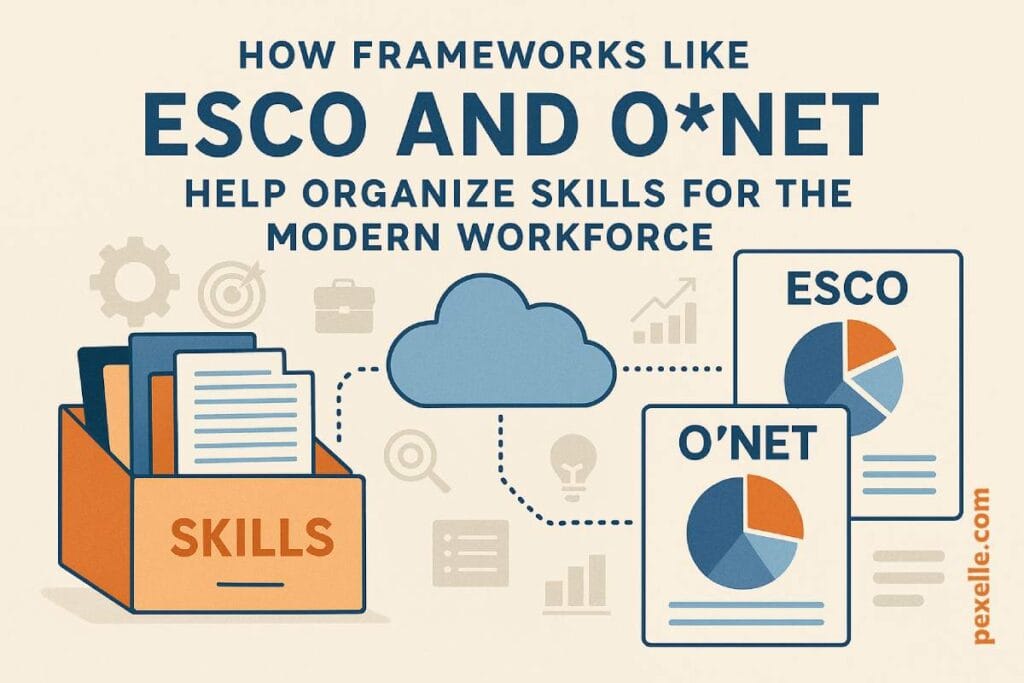How Frameworks like ESCO and O*NET Help Organize Skills for the Modern Workforce

In an era where the pace of change in job markets is faster than ever, skill-based frameworks such as ESCO (European Skills, Competences, Qualifications and Occupations) and O*NET (Occupational Information Network) are playing a crucial role in helping governments, businesses, and individuals navigate the complexities of the labor economy. These frameworks provide structured, standardized taxonomies that classify occupations, skills, and qualifications — becoming essential tools for workforce planning, education alignment, and AI-based job matching systems.
📚 Understanding ESCO and O*NET
ESCO, developed by the European Commission, is a multilingual classification system that connects occupations, skills, and qualifications across EU countries. It is designed to foster mobility within the European labor market and support the integration of skills into education and training systems.
O*NET, on the other hand, is the U.S. Department of Labor’s primary source of occupational information. It categorizes detailed descriptions of over 1,000 occupations using attributes such as knowledge, skills, abilities, tasks, and work activities. It’s the backbone of many workforce development programs, job portals, and career exploration tools in the United States.
🧩 Skill Taxonomy and Interoperability
One of the most valuable contributions of these frameworks is the systematic organization of skills into structured taxonomies. Rather than leaving skills as loosely defined keywords (e.g., “teamwork”, “JavaScript”, “problem-solving”), ESCO and O*NET break them into categories like:
- Core skills (e.g., critical thinking, communication)
- Technical skills (e.g., welding, Python programming)
- Transversal skills (e.g., leadership, adaptability)
These taxonomies are essential for:
- Building AI models that map job requirements to candidate profiles
- Enabling semantic search in job portals
- Ensuring training programs align with real labor market needs
Moreover, the interoperability of these frameworks means they can be integrated into global talent systems. For instance, an HR platform in Europe using ESCO can align its structure with American-based job data built on O*NET via mapping tools.
🤖 Benefits for Job Matching, Education, and Policymaking
1. Personalized Job Matching
By using the rich metadata provided by ESCO and O*NET, platforms can move beyond keyword matching and recommend roles based on inferred competencies. For example, someone with experience in “data entry” may be mapped to roles needing “attention to detail” and “data integrity” skills — expanding their opportunities.
2. Aligning Education with Labor Demand
Educational institutions can use these frameworks to update curricula based on labor market intelligence. ESCO, for instance, links occupations to qualification frameworks, helping schools and universities ensure that their students graduate with job-ready skills.
3. Labor Market Analysis & Policy
Governments and researchers leverage the standardized structure of these databases for macro-level analysis. Skill gaps, future trends, and regional comparisons can be extracted and visualized — aiding workforce development strategies and public investment.
🌍 Toward a Global Skills Ecosystem
While ESCO and O*NET were designed for their respective regions, the globalizing nature of work — especially with remote, freelance, and gig roles — demands a more universal skills language. Organizations like the ILO (International Labour Organization) and initiatives like the World Economic Forum’s Reskilling Revolution are working toward interoperability between such frameworks.
The future likely lies in skills ontologies and linked open data, where frameworks like ESCO and O*NET serve as foundational nodes in a globally connected knowledge graph. This would empower:
- Cross-border hiring
- Real-time job-skill matching
- Dynamic career pathing based on skill evolution
✅ Conclusion
Frameworks like ESCO and O*NET are more than just data repositories — they are infrastructures of skills intelligence. As industries evolve and new jobs emerge, the ability to accurately describe, organize, and connect skills to occupations and training will be crucial for inclusive growth and economic resilience.
Embracing these frameworks enables better job matching, smarter policy decisions, and a more agile workforce ready to meet the demands of the digital and green transitions.
Source : Medium.com




